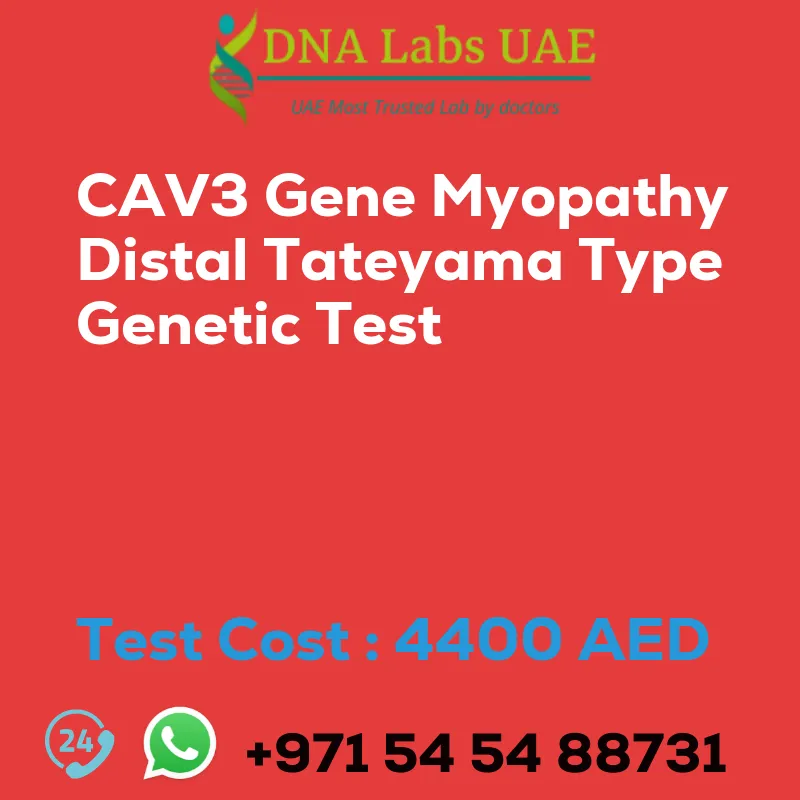CAV3 Gene Myopathy distal Tateyama type Genetic Test
At DNA Labs UAE, we offer the CAV3 Gene Myopathy distal Tateyama type Genetic Test. This test is designed to diagnose a rare genetic disorder that affects the muscles. It is caused by mutations in the CAV3 gene, which provides instructions for making a protein called caveolin-3. This protein plays a crucial role in maintaining the structure and function of muscle cells.
Test Details
The CAV3 Gene Myopathy distal Tateyama type Genetic Test is performed using Next-Generation Sequencing (NGS) technology. NGS is a high-throughput DNA sequencing technology that can analyze multiple genes simultaneously. In the context of CAV3 gene myopathy, this test can identify mutations or variants in the CAV3 gene that may be responsible for the condition.
Test Components and Price
The cost of the CAV3 Gene Myopathy distal Tateyama type Genetic Test at DNA Labs UAE is AED 4400.0. The test requires a blood or extracted DNA sample, or one drop of blood on an FTA Card. The report will be delivered within 3 to 4 weeks.
Symptoms and Diagnosis
The symptoms of CAV3 gene myopathy, distal, Tateyama type can vary but often include muscle weakness, difficulty walking, and muscle cramps. To diagnose this condition, a consultation with a neurologist is recommended. The neurologist will review the clinical history of the patient and may suggest a genetic counseling session to draw a pedigree chart of family members affected with CAV3 Gene Myopathy, distal, Tateyama type.
Test Department and Doctor
The CAV3 Gene Myopathy distal Tateyama type Genetic Test is conducted in our Genetics Test Department. The test is recommended by neurologists who specialize in neurological disorders.
Benefits of the Test
By analyzing the patient’s DNA sample, the NGS genetic test can detect specific mutations or changes in the CAV3 gene, allowing for an accurate diagnosis of CAV3 gene myopathy, distal, Tateyama type. This information can help healthcare professionals develop appropriate treatment plans and provide genetic counseling to affected individuals and their families.
Conclusion
If you or someone you know is experiencing symptoms of CAV3 gene myopathy, distal, Tateyama type, it is important to seek medical attention. The CAV3 Gene Myopathy distal Tateyama type Genetic Test offered at DNA Labs UAE can provide valuable insights for accurate diagnosis and personalized treatment plans. Contact us today to learn more about this test and schedule an appointment with our neurologist.
| Test Name | CAV3 Gene Myopathy distal Tateyama type Genetic Test |
|---|---|
| Components | |
| Price | 4400.0 AED |
| Sample Condition | Blood or Extracted DNA or One drop Blood on FTA Card o |
| Report Delivery | 3 to 4 Weeks |
| Method | NGS Technology |
| Test type | Neurological Disorders |
| Doctor | Neurologist |
| Test Department: | Genetics |
| Pre Test Information | Clinical History of Patient who is going for CAV3 Gene Myopathy, distal, Tateyama type NGS Genetic DNA Test A Genetic Counselling session to draw a pedigree chart of family members affected with CAV3 Gene Myopathy, distal, Tateyama type |
| Test Details |
CAV3 gene myopathy, distal, Tateyama type is a rare genetic disorder that affects the muscles. It is caused by mutations in the CAV3 gene, which provides instructions for making a protein called caveolin-3. This protein plays a crucial role in maintaining the structure and function of muscle cells. A NGS genetic test refers to Next-Generation Sequencing, a high-throughput DNA sequencing technology that can analyze multiple genes simultaneously. In the context of CAV3 gene myopathy, a NGS genetic test can identify mutations or variants in the CAV3 gene that may be responsible for the condition. By analyzing the patient’s DNA sample, the NGS genetic test can detect specific mutations or changes in the CAV3 gene, allowing for an accurate diagnosis of CAV3 gene myopathy, distal, Tateyama type. This information can help healthcare professionals develop appropriate treatment plans and provide genetic counseling to affected individuals and their families. |








